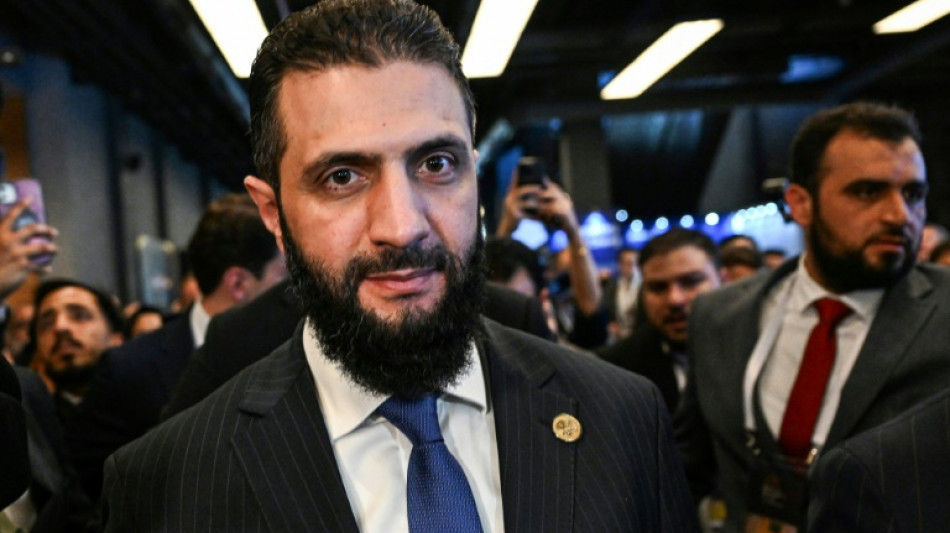
RBGPF
-0.6700

Syrian President Ahmed al-Sharaa on Wednesday meets France's Emmanuel Macron in Paris on his first visit to Europe since overthrowing longtime ruler Bashar al-Assad.
The visit comes with Syria's new authorities, who have roots in the Al-Qaeda jihadist network, under pressure from Europe to show they are serious about protecting human rights as Damascus seeks the full lifting of Assad-era sanctions.
Sectarian clashes in March in which more than 1,700 people were killed, mostly among Assad's Alawite minority, sparked international condemnation and doubts over Syria's new path.
By welcoming Sharaa, Macron hopes to help the authorities on the way to "a free, stable, sovereign Syria that respects all components of Syrian society," a French presidential official, asking not to be named, told AFP.
The official said France was aware of "the past" of certain Syrian leaders and demanding that there be "no complacency" with "terrorist movements" operating in Syria.
Sharaa headed the Islamist group Hayat Tahrir al-Sham (HTS) which spearheaded Assad's downfall after 14 years of civil war. The group formerly had links to Al-Qaeda.
He is still subject to a UN travel ban and France most likely had to request an exemption from the United Nations, as was the case for his recent trips to Turkey and Saudi Arabia, according to a source familiar with the matter.
EU spokesperson Anouar El Anouni said that exemptions can be granted in certain cases if UN officials determine "that the entry or transit is justified".
- 'Humanitarian disaster' -
Macron is due to welcome Sharaa to the Elysee Palace at 1515 GMT followed by a joint news conference.
France, a former colonial-era ruler of Syria, is eyeing an opportunity to increase its influence in the country after years of Russian presence, with French companies also seeking contracts.
Last week, French logistics giant CMA CGM signed a 30-year contract to develop and operate the port of Latakia.
Mehad, a French NGO which has operated in Syria since 2011, warned of a worsening humanitarian crisis in the country and called for "a strong response" from France.
"Emmanuel Macron's strong commitment must now be translated into action, not only by maintaining the budget allocated to humanitarian aid in Syria, but also by disbursing it quickly," said Mehad director Mego Terzian.
"Otherwise we are heading for a humanitarian and health disaster in the country."
Syria's new Islamist authorities have vowed inclusive rule in the multi-confessional, multi-ethnic country.
But as well as the sectarian clashes in March more recent clashes involving fighters from the Druze community and reports of abuses from NGOs have also raised doubts about the interim government's ability to control extremists in its ranks.
Macron will press Sharaa to ensure there is no "impunity" and that all civilians are protected "regardless of their origin or religion," the French presidential official said, reaffirming France's "particularly strong concern" over the clashes.
Adding to pressure on the new Syrian government, Israel has launched hundreds of strikes on the country since Assad's overthrow, including one near the presidential palace in Damascus on Friday.
The French far right criticised the meeting.
Far-right leader Marine Le Pen accused Macron of hosting talks with "a jihadist" who has been involved with the Islamic State group and Al-Qaeda, adding such a meeting would be "provocative and irresponsible".
"Shock and dismay," Le Pen said on X.
Foreign Minister Jean-Noel Barrot, who met with the Syrian leader in Damascus in January, defended the talks.
Not engaging with the leaders of Syria and Lebanon would amount to "rolling out the red carpet for Daesh," Barrot told broadcaster RTL, referring to the Islamic State jihadists.
fec-fff-as-sjw/tw
D.Kovar--TPP